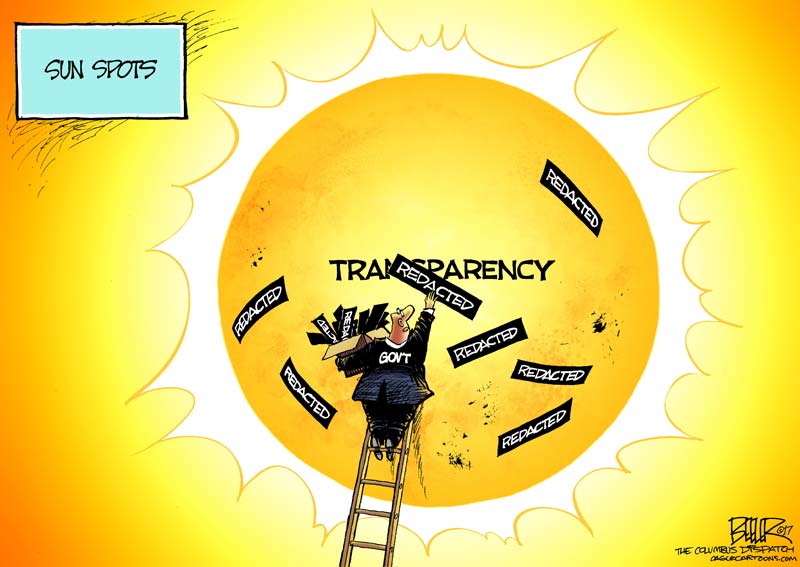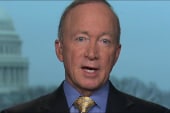
Public officials in the tale try to outdo each other in going "clear" by wearing body cameras and microphones every waking moment. For most readers, the book is farfetched science fiction, but for those active in public life, Eggers's conception doesn't seem all that implausible.
It's hard to determine when too much of a good thing becomes truly too much. And the more laudable the goal, the harder it generally is to reel in the excess, because any suggested retrenchment is viewed as an abandonment of the goal itself. At the risk of being misconstrued, I venture the heretical thought that we have overshot in the pursuit of governmental "openness" and "transparency."
There's no question that American government at all levels is better off for the open-door and open-record reforms of the past half-century. Knowing that the public is watching, public officials generally behave more responsibly in the conduct of their duties.
I'm a true believer. As the director of the Office of Management and Budget in the early 2000s, I worked in perhaps surprising collaboration with Ralph Nader to open the federal government's contracting process to broader public inspection. During my service in Indiana as governor from 2005 to 2013, we made similar changes as a part of wider ethics reforms.
But even water has a fatal dosage level. Too much exercise can be unhealthy. Attempts to eliminate almost all forms of confidential interaction in government come with downsides.
We've seen the unintended consequences of overzealous reform before. Badly needed civil service and procurement reforms initially worked, but they expanded over time until they paralyzed the federal government to a comical degree. Federal employees are in greater danger from a lightning strike than termination for lousy performance, and the procedures for buying, say, a new computer are so byzantine that the machines are outdated by the time they arrive.
The current obsession with transparency is starting to take a similar toll. In a host of ways, government has been rendered less nimble, less talented and less effective.
Honest people are now compelled to become scofflaws in the good-faith pursuit of their duties. Under "open meeting" requirements forbidding members of governing bodies to confer privately, the result is furtive hallway conversations or "executive committee" meetings where the discussion might not technically fall into the category of exemptions that permit such meetings.
Open-records laws have had the same effect. Government took a serious wrong turn at the dawn of the email era when somebody decided that these online exchanges are "documents." Every emailer knows that, perhaps apart from attachments, they are conversations.
I'm rarely on a conference call with other public university presidents that doesn't include someone reminding the group: "No emails!" Even the most deliberative of discussions is vulnerable to later being spread across a newspaper front page.
In sarcastic moments, I sometimes point out the gaping loophole in our public-records laws: Public officials are talking on the phone, and we don't know what they're saying! Clearly, we need a wiretap on every government line and, while we're at it, their home and cellphones. And we'll need surveillance cameras because, next thing you know, they'll switch to speaking in person!
Overall capability in government suffers, too. The excessive background checks and disclosure demands of today's federal employment discourage countless talented people from serving. I watched the number and quality of aspirants to Indiana state judgeships decline over the years. Like many other states, Indiana requires the immediate public identification of interested judicial candidates, and far too many outstanding lawyers, worried about angering their law firms, clients or employers, stay on the sidelines.
Maybe the worst net negative effect of the openness obsession is on the spirit of compromise --- a spirit that is prized, ironically, by many transparency advocates. There is a reason the Constitutional Convention of 1787 was held privately and no official minutes were kept. Men who argued fiercely against certain provisions preserved their ability to accept second-best outcomes, and to go home and advocate ratification of the overall agreement.
None of this is to suggest a major rollback; we are better off for the sunshine. But for the best of reasons, "transparency" has risen to sacred status, and even moderate change will be difficult. A news media accustomed to rummaging through email records and visitor logs may be especially unsympathetic. Still, it's time for us all to consider broadening the definitions of what communications should remain confidential and to grant more leeway for the kinds of meetings that are often essential to producing workable compromises.
I hope I've made myself . . . clear.
Daniels, a Washington Post contributing columnist, is president of Purdue University and a former governor of Indiana.
Previously:
• 07/31/18: When a state is drowning in debt, should the rest of us have to pay?
• 07/10/18: Big Data is always watching
• 07/03/18: Learning from our mistakes in higher ed
• 06/14/18: Entitlement can is getting too heavy to kick
• 04/23/18: Our judgments about the past should make us a little less arrogant about the way we act today
• 12/29/17: Avoiding GMOs isn't just anti-science. It's immoral
• 12/08/17: Is anyone ever wrong anymore?


 Contact The Editor
Contact The Editor
 Articles By This Author
Articles By This Author